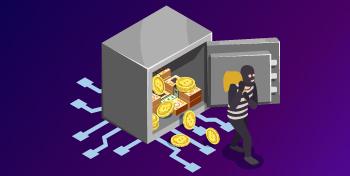Due to the rapid development of the cryptocurrency sector, it is important that there are platforms where you can trade cryptocurrencies. Since the world became familiar with the concept of cryptocurrencies, the emergence of new crypto exchanges has begun to grow.
CEX vs DEX
The prosperity of the cryptocurrency market is largely due to the success of centralized (custodial) exchanges or CEX. This seems ironic, since decentralization is one of the foundations of cryptocurrencies.
Despite this, a large number of people prefer to use centralized exchanges, rather than experience difficulties with maintaining crypto-wallets themselves. CEX exchanges provide easier entry of Fiat funds and are easier to use, compared to decentralized crypto exchanges (or DEX).
Let’s look at the main differences between the existing types of exchanges: centralized and decentralized, consider and compare them by different criteria.
Centralized exchanges (CEX)
The meaning of CEX can be understood from the word “centralized”, which means the management of an organization, the body that manages all internal exchange operations. Trusting someone else to manage your money is an important part and possibly the driving force behind a centralized crypto exchange. CEX has a lower barrier to entry for novice investors, as it allows you to buy cryptocurrency using Fiat and withdraw profits back to Fiat, through the integration of payments by banks and service providers.
The advantages of centralized exchanges are listed below:
- No complexities of self-management of funds: one hundred percent control over your money is really good, but centralized cryptocurrency exchanges remove this responsibility from the client. Since you fully trust your money to a third party or intermediary, working with a centralized exchange is certainly easier than managing your money yourself.
- Easy account recovery: there have been many stories of customers potentially losing hundreds of thousands of dollars or euros just because they lost the private keys to their hardware wallets. CEX makes it easier to recover lost access to your account because the client has allowed the exchange with full access to their account. If the client needs to restore access to their account at all, the simple task of verifying their identity will help.
- Use of reliable Fiat currencies: dollars, euros, and rubles are among the most widely used currencies. A good centralized exchange will definitely provide you with the opportunity to trade these currencies together with others, however, if it can be feasible for them. It should be noted that not all crypto exchanges can provide Fiat / cryptocurrency pairs, that is, the ability to exchange Fiat currencies for crypto. Some of the popular CEX that provide this feature are Coinbase, Robinhood, and Gemini.
- Liquidity: centralized exchanges reduce the friction associated with trading by providing liquidity and convenience. The examples mentioned above (Coinbase, Gemini) are crypto exchanges that provide greater stability of exchange rates. Increased volume is always an indicator of stability, which centralized exchanges seem to be well versed in.
The need for decentralized exchanges

Despite the fact that CEX meets the needs of most customers, there are obvious holes and shortcomings in the concept of centralized cryptocurrency exchange. Anonymity issues, hacks, security issues, and other factors lead us to believe that the need for DEX is much greater and perhaps more in line with the idea of cryptocurrencies than previously thought.
A. Security concerns
No crypto exchange is immune from hacking. According to statistics, one in 16 Bitcoins is lost or stolen, which quite accurately determines the scale of the problem with CEX. High-profile hacks have led us to believe that these exchanges, running on a Central mainframe, can not become, but are a target for hackers. Choose a centralized platform and you will have access to hundreds of thousands of dollars worth of data and money.
What’s more, a long string of hacks and scams from popular platforms like Bithumb to nondescript ones like 796Exchange has caused dissatisfaction among CEX users. In 2014, Mt. Gox lost almost $ 470 million worth of Bitcoins. In 2016, about $ 72 million of PTS was stolen from Bitfinex. Even Binance had $ 40 million worth of Bitcoins stolen in may 2019, which they reimbursed the affected accounts from their reserves.
B. Anonymity issues
When you choose to work on a centralized site, your privacy is limited because you must provide relevant data, such as Bank account numbers, card details, and other personal data. Also, because of the way these exchanges work, tracking transactions is incredibly easy due to the centralized nature. This is a huge vulnerability when it comes to your data and personal information.
C. Centralized nature
Perhaps one of the biggest drawbacks of CEX is that they are centralized. This moves away from the very basic idea behind technologies like blockchain and currencies like Bitcoin. Cryptocurrencies aim to eliminate the very idea of entrusting your money to someone else, and CEX forces us to do just that, replacing the very concept of a crypto asset. Regulation, taxation, anonymity, security-all these are problems that exist with CEX, which contradict the very purpose of cryptocurrencies and blockchain.
Decentralized exchanges (DEX)
DEX are different, but they have one quality in common: they are not related to storage. They use smart contracts to manage funds in the chain, so users will never have to trust their money to a third party.
However, the exchange part is how buyers and sellers find each other, and it can vary greatly from one implementation to another.
Decentralization is all they promise. They try to resist all the disadvantages of CEX and remain true to the ideology of blockchain and cryptocurrency, being independent of any third-party custodians. When working on decentralized nodes, there is no risk of disabling the entire network with just one hit. This is one of the most important security features of DEX, so it is much more difficult to hack it than CEX.
When it comes to DEX, privacy is no longer a myth. Creating accounts and starting trading on a decentralized exchange requires very little or nothing from your approval or data. In addition, when you make a transaction, your identity is only disclosed to the other party involved in the transaction. This way, when you trade on DEX, your personal data will be truly yours. The lack of regulation and mediation plays an important role in giving DEX its characteristic features.
Since all the problems associated with CEX seem to be solved with DEX, the logical question is why they are still not accepted worldwide?
Issues regarding decentralized exchanges

There are several major issues that prevent the mass adoption of decentralized crypto exchanges.
First, they can’t generate much of the trading volume, because of the order book in the chain. The gas costs that arise each time an order has to be placed, changed, or canceled are too high to bear. In addition, it usually takes up significant bandwidth on the network and eventually leads to bloat of the blockchain.
Second, low liquidity. This is perhaps one of the few areas where CEX is superior to DEX, in part due to the inconvenience of trading on decentralized exchanges. In addition, cross-chain transactions are still far from being implemented at a globally acceptable level.
Front-running can also be a major challenge for decentralized exchanges, as the Etherdelta case showed that miners can take advantage of the fact that they are able to see transactions even before they are added to the blockchain. This makes it possible to benefit from canceled orders by releasing their transactions to the blockchain earlier than yours.
In order for DEX to work, the entire world must function as a network of interconnected crypto exchanges with shared liquidity, and everyday transactions must be performed using crypto assets rather than Fiat money, which will make the Fiat type of payments obsolete and therefore completely eliminate the barrier to entry. This is a problem for today.
It is important to remember that if DEX performance can be scaled using layer 2 solutions such as the 0x Protocol, shared liquidity concepts such as order books, zk – snarks, and atomic swaps, then one day we will see a reduction in differences.
Conclusion
The final word is that DEX definitely has the potential to surpass CEX in every possible aspect. They remain true to the most fundamental idea of the blockchain they are working on, but several major issues are hindering their global acceptance.
However, centralized and decentralized exchanges have their advantages. Those who realize this are switching to the CEX + DEX hybrid model.
Will the war between CEX and DEX ever end? Soon learn.


